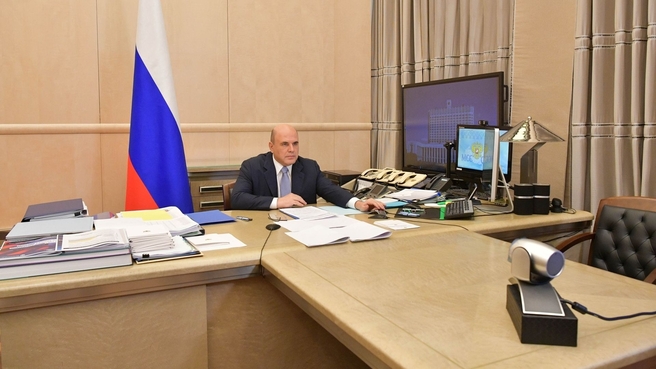The meeting was held via videoconference.
Mikhail Mishustin’s opening remarks:
Good morning, colleagues.
The Government has approved a three-year roadmap for the development of electricity transmission technologies and intelligent energy systems. The President spoke about the need for new approaches in this sphere in his Address to the Federal Assembly. We need latest-generation innovative solutions in power transmission, from enhancing the reliability of the power systems to using new composite materials for high-voltage wires, so as to ensure uninterrupted electricity supply for people and businesses, and reduce energy losses.
We will launch the domestic manufacturing of the entire range of critically important equipment, first of all high-temperature superconductors and digital transformer substations, and we will improve the domestic components base for process control.
One of our priorities is to introduce energy storage systems, which will propel the use of renewable energy sources, such as wind generators and solar power stations, to a new level. These technologies are needed above all in remote and hard-to-access areas without central power supply systems.
In addition, we will also introduce smart electricity meters. This digital solution will rule out the manual transfer of data from power meters, preclude electricity theft and reduce the time needed to report accidents in the power supply system. We must start implementing this roadmap without any delay.
Here is one more important subject we will be discussing. As per the President’s instructions, the Government continues working to reduce regulatory pressure in construction. This approach helps cut down on the duration of construction and hence the cost without prejudicing security.
Last year, there were over 10,000 requirements in this sector. The Government has taken the first step by terminating about 3,000 of them. I would like to remind you that we did this in July 2020. Besides, the majority of rules and regulations have been updated.
Here is one more decision we are taking in this sphere. We have adopted a resolution to reduce the number of requirements by approximately 4,000. It will come into effect on 1 September 2021. Restrictions will be lifted on the use of novel functional materials and structures, and all redundant and excessive norms, including declarative and non-binding provisions, will be cancelled.
All the requirements in this sector must be clear and logical. And, of course, they should not lead to contradictions as this directly influences the safety of buildings and hence the life and health of our people.
We are also working to improve the system of higher education.
The Government has approved new rules that allow universities to accept grants for developing educational programmes in the field of artificial intelligence. We have earmarked for this purpose over 600 million roubles in the federal budget for the next three years. We need professionals who will not just learn to use modern technology and equipment, but who will also be able to create software and devise innovative solutions in a variety of spheres.
Students will be able to receive bachelor’s and master’s degrees in AI-related technologies, and their teachers will be able to upgrade their skills in this sphere. We hope that in three years our universities will offer at least 10 bachelor’s degrees and at least 40 master’s degrees, and that over 3,000 university teachers will receive additional education in these fields.
These new programmes will be available at universities throughout the country. Competitive admissions will be organised by the Ministry of Science and Higher Education. We hope that on 1 September there will be 2,000 students and teachers in these programmes.
I would like to say a few words about general education.
We continue to create additional places at schools so that each child in the country has an opportunity to receive education at modern and well-equipped schools. New schools are being built in accordance with the President’s instructions. Some of them have been completed, but we still need to build as many as 800 schools. We must create additional places for over 640,000 pupils. Budgetary allocations for this have been earmarked, including nearly 33 billion roubles for this year. The Government will allocate some 145 billion roubles for this purpose in the next three years.
Moreover, we are also building schools on the basis of public-private partnership. The Altai Territory authorities suggested using this method for two educational establishments during my working visit there. We decided to support these projects. We hope that this will help build new, modern schools for children quicker.
One more topic is the preparation of sports infrastructure for the World Junior Ice Hockey Championships, which will be held in Novosibirsk in two years. We discussed this issue with the governor during our visit to the region.
The largest and most complicated project under construction for this event is the Ice Sports Arena. Its construction has been estimated at some 10 billion roubles. The Government will additionally allocate more than 800 million roubles to complete this project. This will help reduce the burden on the regional budget as part of preparations for this major international event. The construction of the arena must be finished next year.










